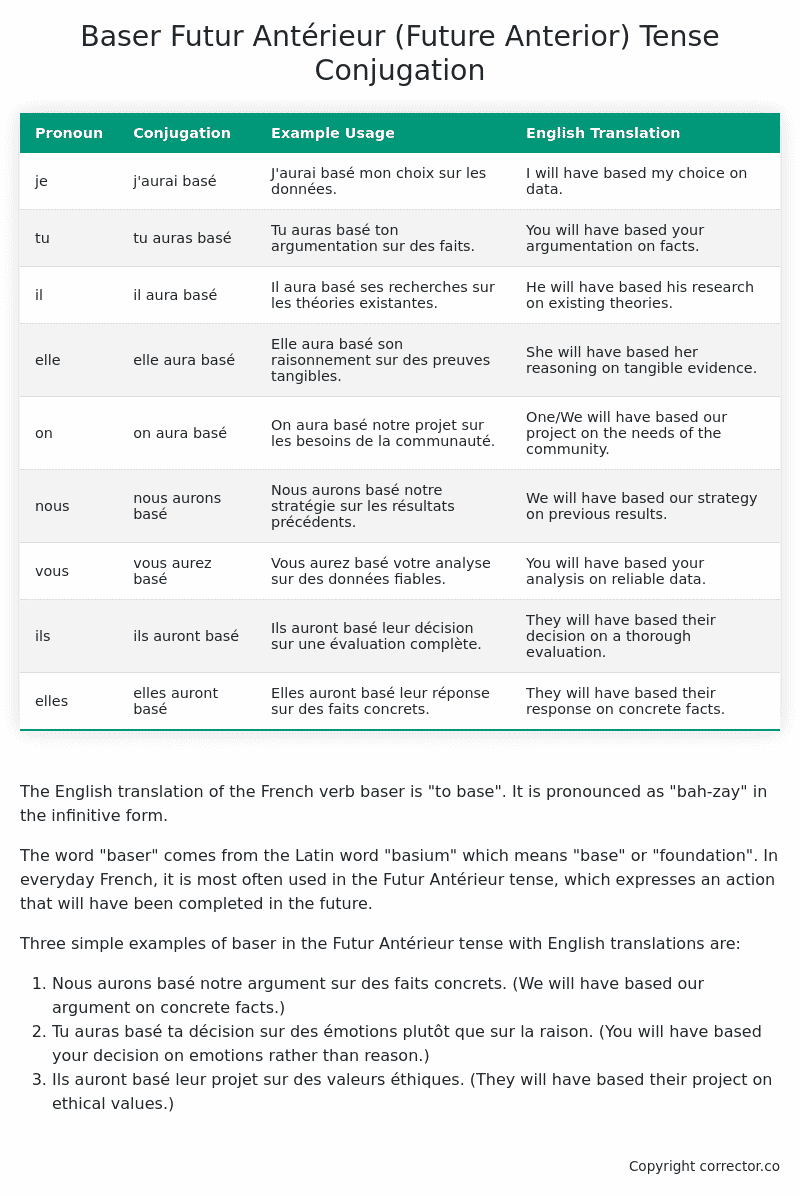Futur Antérieur (Future Anterior) Tense Conjugation of the French Verb baser
Introduction to the verb baser
The English translation of the French verb baser is “to base”. It is pronounced as “bah-zay” in the infinitive form.
The word “baser” comes from the Latin word “basium” which means “base” or “foundation”. In everyday French, it is most often used in the Futur Antérieur tense, which expresses an action that will have been completed in the future.
Three simple examples of baser in the Futur Antérieur tense with English translations are:
- Nous aurons basé notre argument sur des faits concrets. (We will have based our argument on concrete facts.)
- Tu auras basé ta décision sur des émotions plutôt que sur la raison. (You will have based your decision on emotions rather than reason.)
- Ils auront basé leur projet sur des valeurs éthiques. (They will have based their project on ethical values.)
Table of the Futur Antérieur (Future Anterior) Tense Conjugation of baser
| Pronoun | Conjugation | Example Usage | English Translation |
|---|---|---|---|
| je | j’aurai basé | J’aurai basé mon choix sur les données. | I will have based my choice on data. |
| tu | tu auras basé | Tu auras basé ton argumentation sur des faits. | You will have based your argumentation on facts. |
| il | il aura basé | Il aura basé ses recherches sur les théories existantes. | He will have based his research on existing theories. |
| elle | elle aura basé | Elle aura basé son raisonnement sur des preuves tangibles. | She will have based her reasoning on tangible evidence. |
| on | on aura basé | On aura basé notre projet sur les besoins de la communauté. | One/We will have based our project on the needs of the community. |
| nous | nous aurons basé | Nous aurons basé notre stratégie sur les résultats précédents. | We will have based our strategy on previous results. |
| vous | vous aurez basé | Vous aurez basé votre analyse sur des données fiables. | You will have based your analysis on reliable data. |
| ils | ils auront basé | Ils auront basé leur décision sur une évaluation complète. | They will have based their decision on a thorough evaluation. |
| elles | elles auront basé | Elles auront basé leur réponse sur des faits concrets. | They will have based their response on concrete facts. |
Other Conjugations for Baser.
Le Present (Present Tense) Conjugation of the French Verb baser
Imparfait (Imperfect) Tense Conjugation of the French Verb baser
Passé Simple (Simple Past) Tense Conjugation of the French Verb baser
Passé Composé (Present Perfect) Tense Conjugation of the French Verb baser
Futur Simple (Simple Future) Tense Conjugation of the French Verb baser
Futur Proche (Near Future) Tense Conjugation of the French Verb baser
Plus-que-parfait (Pluperfect) Tense Conjugation of the French Verb baser
Passé Antérieur (Past Anterior) Tense Conjugation of the French Verb baser
Futur Antérieur (Future Anterior) Tense Conjugation of the French Verb baser (this article)
Subjonctif Présent (Subjunctive Present) Tense Conjugation of the French Verb baser
Subjonctif Passé (Subjunctive Past) Tense Conjugation of the French Verb baser
Subjonctif Imparfait (Subjunctive Imperfect) Tense Conjugation of the French Verb baser
Subjonctif Plus-que-parfait (Subjunctive Pluperfect) Tense Conjugation of the French Verb baser
Conditionnel Présent (Conditional Present) Tense Conjugation of the French Verb baser
Conditionnel Passé (Conditional Past) Tense Conjugation of the French Verb baser
L’impératif Présent (Imperative Present) Tense Conjugation of the French Verb baser
L’infinitif Présent (Infinitive Present) Tense Conjugation of the French Verb baser
Struggling with French verbs or the language in general? Why not use our free French Grammar Checker – no registration required!
Get a FREE Download Study Sheet of this Conjugation 🔥
Simply right click the image below, click “save image” and get your free reference for the baser Futur Antérieur tense conjugation!

Baser – About the French Futur Antérieur (Future Anterior) Tense
Construction
Common Everyday Usage Patterns
Interactions with Other Tenses
For example
Summary
I hope you enjoyed this article on the verb baser. Still in a learning mood? Check out another TOTALLY random French verb conjugation!


